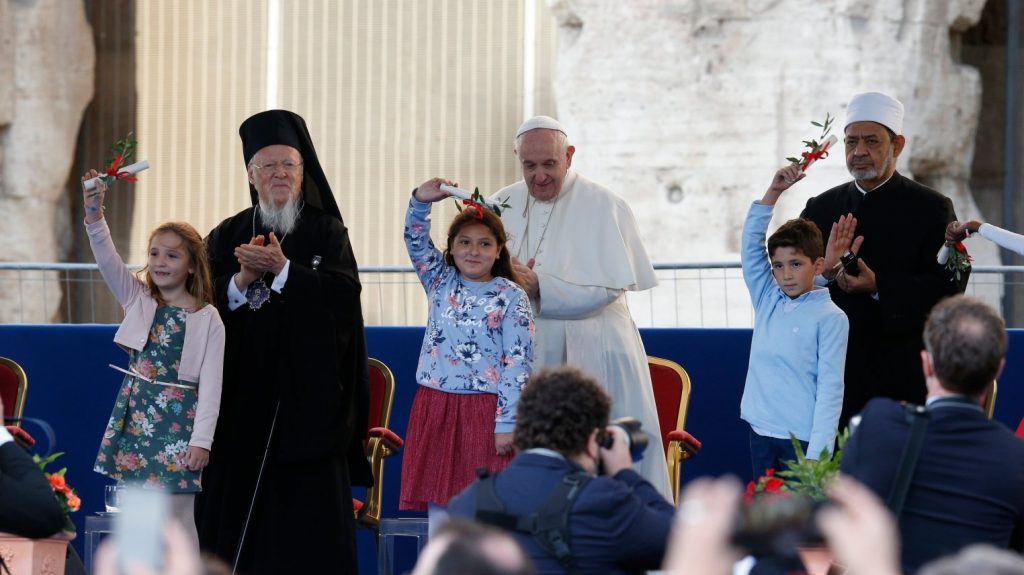Pope Francis on Thursday said that war is a “stinging defeat” before the forces of evil, called for believers of all faiths to “defuse the temptation to fundamentalism and every tendency to view a brother or sister as an enemy.”
People of faith, Francis said, have the responsibility to help eradicate hatred from human hearts and condemn all forms of violence.
“Let us unambiguously urge that arms be set aside and military spending reduced, in order to provide for humanitarian needs, and that instruments of death be turned into instruments of life,” the pontiff said. “May ours not be empty words, but insistent appeals for the welfare of our brothers and sisters, opposing war and death in the name of the One who is peace and life. Fewer arms and more food, less hypocrisy and more transparency, more vaccines distributed fairly and fewer weapons marketed indiscriminately.”
The pope’s remarks came as he took part in the 35th encounter in the “Spirit of Assisi,” organized by the Community of Sant’Egidio and taking place in Rome’s Colosseum. The event began on Wednesday, under the theme of “Brothers and Sisters, Future Earth. Religions and Cultures in Dialogue.”
Francis was surrounded by several prominent religious leaders, including Patriarch Bartholomew, of Constantinople, and the grand Imam of Al-Alzhar university, Ahmed Al Tayyeb.
Also present was German Chancellor Angela Merkel, who earlier in the day had visited the pontiff in the Vatican.
Speaking at the backdrop of Rome’s Colosseum, Francis called it the scene of “spectacles of fratricide, deadly games played at the cost of human lives.” The same happens today, he argued, because humans can “be spectators of violence and war, of brothers killing brothers, like games we watch from a safe distance, indifferent, certain that they will never affect us.”
The suffering of others, he said, scarcely becomes troublesome, with most not allowing themselves to be moved by victims of wars, migrants, of children trapped in conflict and robbed of the games of childhood.
“The lives of peoples and young children are not playthings,” the pope said. “We may not be indifferent onlookers. On the contrary, we need to empathize with those who share our humanity, its aspirations, its struggles and its frailties. Today, in a globalized society that sensationalizes suffering, yet remains incapable of sympathizing with it, we need to construct compassion.”
Listening to others, and going beyond complacency, requires real courage, he said, and it’s necessary to care for others because “we cannot allow the lives of entire peoples to become mere pawns in a game of power. The life of peoples is not part of a game: It is something serious and of concern to everyone.”
Francis also said that the COVID-19 pandemic has been an opportunity to remember that it’s impossible to remain healthy when the world is sick.
“In recent times, many people have contracted the sickness of forgetfulness, forgetfulness of God and of our brothers and sisters. This has led to unbridled individualism and the desire for self-sufficiency, which has overflowed in insatiable greed,” he continued.
This greed has had an impact on God’s creation, with the air being “rich in toxins but poor in solidarity.”
Condemning war, Francis said that it “plays games” with human lives, as does violence and the burgeoning arms trade, that often times moves in the shadows, fed by “underground streams of money.”
“War is a failure of politics and of humanity, a shameful capitulation, a stinging defeat before the forces of evil,” he said.
During his remarks, Al Tayyeb said that the climate crises and the pandemic should have made the world immediately turn to heaven to invoke mercy in answer to the prayers of the victims.
“However, the world’s policies regarding this pandemic do not indicate a real awareness in the consciousness in people’s behavior about the need to turn to God the Most High with prayers and invocations in order to face this perennial danger,” the Imam said.
He also called on pharmaceutical companies to do a better job producing and distributing the COVID-19 vaccine.
He pointed out that the unequal distribution has led to some countries having vaccinated three-quarters of the population, while in Africa, less than three percent has been inoculated against COVID-19.
The event closed with a young woman who recently fled Afghanistan reading an appeal for peace.
“Peoples suffer,” says the appeal. “The refugees of war and of the environmental crisis are suffering, the discarded, the weak, the defenseless. They are often offended and humiliated women, children without a childhood, abandoned old people. The poor, so often invisible, today participate in a special way in our meeting: they are the first to invoke peace. Listening to them makes us better understand the folly of all conflicts and violence.”
According to the organizers of the event, who drafted the appeal, religions can build peace and educate the faithful to it. Religions “cannot be used for war,” they said, because only peace comes from God.
“No one should ever use the name of God to bless terror and violence,” the Afghani woman read. “If you see wars around you, do not be resigned! Peoples long for peace.”

